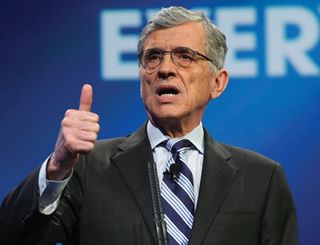Washington Gets a Very Public Privacy Battle

What exactly are the rules for Internet privacy, and who has the right to enforce them?
Those two issues are at the heart of one of the most contentious debates roiling the broadband industry today.
The FCC’s reclassification of Internet access under Title II gives the commission new powers to create rules for “protecting” broadband CPNI (customer proprietary network information). That could mean creating “opt-in” methods for collecting online personal information that many public interest groups have been clamoring for, and take a bite out of targeted behavioral advertising.
It is unclear just how the FCC will approach its self-given power to regulate in the space—which is the main dissenting issue that Internet service providers have with much of the Title II order.
The new broadband CPNI oversight has also created a jurisdictional tug-of-war between the FCC and the Federal Trade Commission, which has been overseeing broadband privacy but must relinquish that to the FCC under the new rules, unless Congress steps in.
“To have the FCC usurp the authority of the Federal Trade Commission is a very bad idea. It’s going to lead to regulation of the Internet in ways that some of the people who have been calling for that have not imagined,” House Judiciary Committee chairman Bob Goodlatte (R-Va.) told C-SPAN in an interview.
The fear of the FCC’s regulation of broadband privacy is similar to industry fears about the Internet conduct standard contained in the new open Internet rules, which is fear of the unknown. The FCC tried to give ISPs some guidance in an Enforcement Bureau advisory two weeks ago, but the advice was essentially for them to make good faith efforts to protect privacy, and if they were unsure, run it by the FCC just in case.
Broadcasting & Cable Newsletter
The smarter way to stay on top of broadcasting and cable industry. Sign up below
Jessica Rich, director of the Federal Trade Commission’s Bureau of Consumer Protection, in pushing for retaining jurisdiction over data security online, told Congress in March during a hearing on that bill that the FCC’s decision to reclassify ISPs under Title II, which removes the issue from FTC purview, had made it harder to protect consumers.
The FCC appears to have the votes to flex its muscle on privacy.
A month ago, the FCC held a workshop essentially launching the process of figuring out what it was going to do with its new privacy authority. Commission chairman Tom Wheeler framed the issue in historical terms, citing telegraph messages being intercepted during the Civil War.
“Consumers have the right to expect privacy in the information networks collect about them,” he said, and in a digital world, he added, everybody is leaving digital footprints “all over the place.”
Privacy is unassailable, he added, as is the virtuous circle of innovation begetting innovation.
Wheeler is clearly viewing privacy as one issue—like competition and access—that needs to be viewed in the sweep of history while taking the long view from the high hill, which could make it hard for opponents of the commission’s strong new privacy regulations to argue it in the weeds of policy.
ALL POLITICS IS LOCAL (TV)
The majority of baby boomers continue to turn to local broadcast TV for political news, while roughly the same percentage of millennials turn to Facebook for that information. But cable came out ahead of everyone as the main source of that news.
Those are among the findings of a newly released Pew Research Center survey of 3,000 adults.
“When it comes to where younger Americans get news about politics and government, social media looks to be the local TV of the millennial generation,” said Pew Research Center director of journalism research Amy Mitchell in releasing the study, appropriately subtitled “Social Media—the Local TV for the Next Generation?”
The greatest percentage of millennials (61%) and gen-Xers (51%) say they got political news from Facebook, while 60% of baby boomers got it from local TV, according to the study. Local TV was also the second most popular source for gen-Xers at 46%. For millennials it was CNN, and for boomers, NBC News.
But when it came to what was identified as the main source of news about government and politics, cable news was the big winner.
Contributing editor John Eggerton has been an editor and/or writer on media regulation, legislation and policy for over four decades, including covering the FCC, FTC, Congress, the major media trade associations, and the federal courts. In addition to Multichannel News and Broadcasting + Cable, his work has appeared in Radio World, TV Technology, TV Fax, This Week in Consumer Electronics, Variety and the Encyclopedia Britannica.

